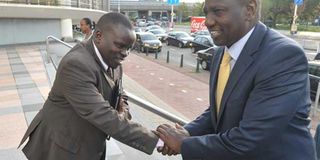ICC: William Ruto case witnesses must testify

Deputy President William Ruto (right) and former radio presenter Joshua arap Sang outside the ICC at The Hague. FILE PHOTO |
What you need to know:
- Kenya ordered to ensure Hague-based court gets evidence either in person or via video link
Deputy President William Ruto’s hopes of weakening prosecution evidence in the case he faces at The Hague suffered a blow on Thursday after eight witnesses who dropped out were compelled to testify.
Trial Chamber judges, in a majority ruling, ordered the government to compel the witnesses to testify either in person or through video-link and guarantee them safety for the period before and after their evidence.
Judges Chile Eboe-Osuji and Robert Fremr agreed with the arguments of Prosecutor Fatou Bensouda for Kenya to subpoena the eight witnesses to testify in the case facing Mr Ruto and former radio journalist Joshua arap Sang.
Judge Olga Herrera Carbuccia dissented.
Those affected by the ruling are witnesses 15, 16, 336, 397, 516, 524, 495 and 323.
“The Chamber hereby requires the appearance of the witnesses bearing the pseudonyms indicated below, as a matter of obligation upon them, to testify before this Trial Chamber by video-link or at a location in Kenya and on such dates and times as the Prosecutor or the Registrar (as the case may be) shall communicate to them,” they said in the ruling on Thursday.
The judges asked the government to use all means at its disposal to ensure that the witnesses appear before court or testify at a location in Kenya which the ICC will decide.
“The chamber requests the assistance of the Government of Kenya in ensuring the appearance of the witnesses as indicated above, using all means available under the laws of Kenya,” they said.
The judges ruled that the government passes the message to the witnesses, compels their attendance or testimony before the Trial Chamber at a place in Kenya and grants them security until they conclude their testimonies.
The ruling signals that toughening position against the Jubilee administration leadership by the ICC in the last one month.
REQUEST FOR INFORMATION
Three weeks ago, the Trial Chamber presiding over President Uhuru Kenyatta’s case ordered the government to submit his wealth records which Ms Bensouda hopes will provide more evidence in her case against the Head of State.
This week, the ICC prosecutor wrote to the government, listing the pieces of information which should be submitted with the judges requiring the government to report the progress by the end of the month or risk consequences.
Thursday’s ruling was made following Ms Bensouda’s application to the Trial Chamber to compel the eight witnesses to testify after they voluntarily declined to appear.
She argued that the testimonies of the witnesses who withdrew were key to the charges of crimes against humanity which arose from the 2007/8 post-election violence.
Some 1,133 Kenyans were killed and more than 600,000 displaced in the violence.
“The prosecution argues that the testimony of the eight witnesses is necessary with a view to facilitating the investigation and prosecution of crimes within the jurisdiction of the Court and that the issuance of the requests for cooperation, and the Government of Kenya’s assistance, is necessary to obtain the testimony of the witnesses,” the judges said.
They rejected the application by the Deputy President’s defence that Witness 15 be spared the task of testifying for health reasons.
Mr Ruto’s defence led by Mr Karim Khan had earlier said they were not opposed to the subpoenas but changed their position earlier in the year when they said the ICC had no powers to ask Kenya to compel the witnesses to attend.
Mr Sang’s legal team had maintained that the Trial Chamber had no powers to compel the witnesses to appear.




